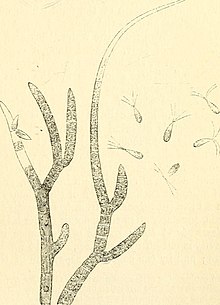
The sea lettuces comprise the genus Ulva, a group of edible green algae that is widely distributed along the coasts of the world's oceans. The type species within the genus Ulva is Ulva lactuca, lactuca being Latin for "lettuce". The genus also includes the species previously classified under the genus Enteromorpha, the former members of which are known under the common name green nori.
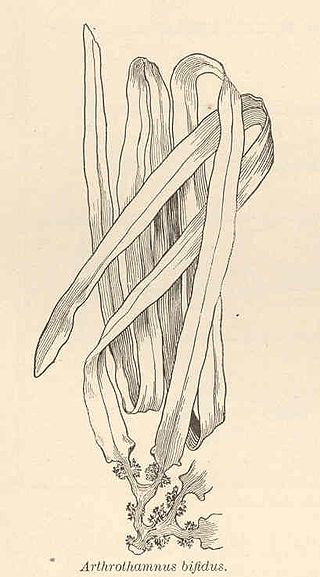
Arthrothamnus is a genus of brown alga comprising approximately 2 species. It includes the algae commonly known as nekoashi-kombu, oarweed and chishima-nekoashi-kombu. Bifurcariopsis reproduces by means of conceptacles; it produces tetraspores and dispores and carpospores.

AlgaeBase is a global species database of information on all groups of algae, both marine and freshwater, as well as sea-grass.

Chaetophoraceae is a family of green algae in the order Chaetophorales.

Chaetophora is a genus of green algae in the family Chaetophoraceae.
Ourococcus is a genus of green algae, in the family Coccomyxaceae. As of February 2022, although AlgaeBase states that the genus is "accepted taxonomically", the type species Ourococcus bicaudatus is said to be a synonym of Keratococcus bicaudatus, and no species of the genus are listed as accepted.
Pleurastrum is a genus of green algae, specifically of the Chlorophyceae. As of February 2022, it was the only genus in the family Pleurastraceae.
Genicularina is a genus of green algae, specifically of the Gonatozygaceae.
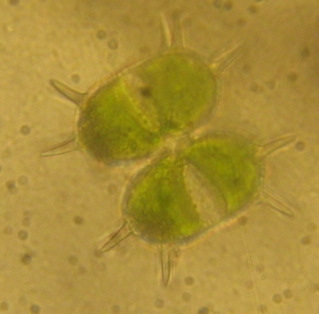
Xanthidium is a genus of green algae, specifically of the Desmidiaceae.

Chlorococcum amblystomatis, synonym Oophila amblystomatis, commonly known as chlamydomonad algae or salamander algae, is a species of single-celled green algae. When placed in the genus Oophila, it was the only species. The Latin specific name amblystomatis means "loves salamander eggs". It does not occur anywhere in nature other than in the eggs of the spotted salamander, Ambystoma maculatum. The alga can invade and grow in the amphibian's egg capsule. Once inside, it metabolizes the carbon dioxide produced by the embryo and provides it with oxygen and sugar as a result of photosynthesis. This is an example of symbiosis, and the only known example of an intracellular endosymbiont microbe in vertebrates.
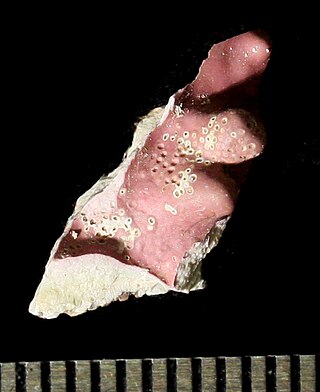
Lithothamnion is a genus of thalloid red alga comprising 103 species. Its members are known by a number of common names. The monomerous, crustose thalli are composed of a single system of filaments which grow close to the underlying surface. Lithothamnion reproduces by means of multiporate conceptacles.

Galaxaura is a genus of thalloid red algae.
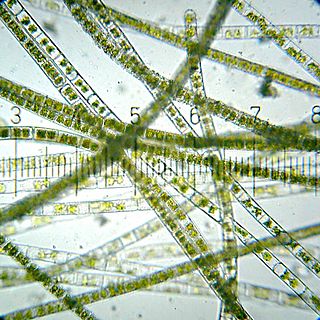
Zygnema is a genus of freshwater filamentous thalloid alga comprising about 100 species. A terrestrial species, Z. terrestre, is known from India. Zygnema grows as a free-floating mass of filaments, although young plants may be found anchored to streambeds with a holdfast. The filaments form a yellow-green to bright green colored tangled mat, and are composed of elongate barrel-shaped cells, each with two star-shaped (stellate) chloroplasts arrayed along the axis of the cell.

Claudea is a marine red alga genus.

Rivularia is a genus of cyanobacteria of the family Rivulariaceae.
Cyanonephron elegans is a freshwater species of cyanobacteria in the family Synechococcaceae. It is described in the Netherlands, Siberia, Russia and Queensland, Australia.
